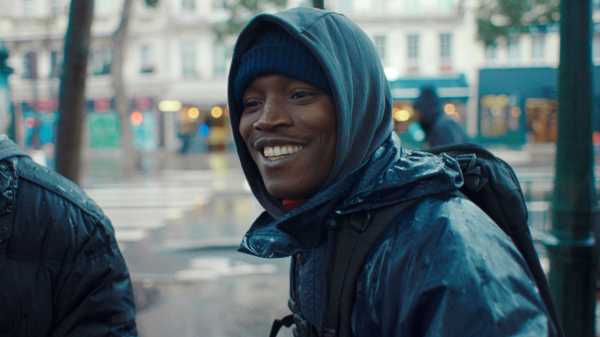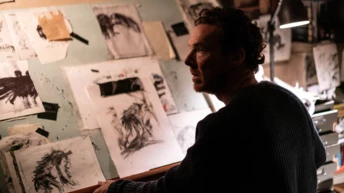
Save this storySave this storySave this storySave this story
The title of the new film from the French director and screenwriter Boris Lojkine, “Souleymane’s Story,” has a few entwined meanings. In the broadest sense, it describes the movie itself: this is the story of Souleymane (Abou Sangaré), an undocumented immigrant from Guinea-Conakry, who is living in Paris. He is seeking asylum through the French Office for the Protection of Refugees and Stateless Persons (OFPRA), which is where the title’s second meaning arises. Souleymane’s application requires an in-person interview, and he plans to tell a fabricated story about the circumstances that sent him abroad: namely, that he was forced to flee Guinea after being arrested and imprisoned for political activism. The source of this tale is a man named Barry (Alpha Oumar Sow), who coaches refugees like Souleymane to lie in their interviews for sympathetic and dramatic effect, and even supplies them with false documents that might corroborate those lies.
When Souleymane rehearses his account, in an early scene, Barry admonishes him for blandly reciting (and often bungling) the false facts he’s been given. “It has to sound like your life experience,” he says. “Go into detail, because details count.” In invoking the differences between a plausible tale and a clearly phony one, “Souleymane’s Story” sets itself something of a challenge. After all, Lojkine’s movie, which he co-wrote with Delphine Agut, is itself a tightly focussed, carefully constructed fiction. It begins with a ticking-clock premise—Souleymane’s interview is in just two days—that pressurizes, in generic yet effective fashion, an already fraught set of personal circumstances. The film’s considerable power depends entirely on its moment-to-moment persuasiveness, on a set of narrative and aesthetic choices that, as presented—in a series of swift, kinetically composed, and jaggedly edited scenes—seldom feel like choices at all.
Details do count for everything here, and Lojkine deploys them skillfully, with an eye toward immersing us in his protagonist’s gruelling everyday routine. Souleymane works as a courier, and he spends most of his days crisscrossing the city on his bike, picking up and dropping off food deliveries. (Lojkine and his cinematographer, Tristan Galand, shot much of the footage by chasing after Sangaré on bikes of their own.) But Souleymane’s difficulties go beyond the usual indignities of scant pay and exhausting hours. Because he cannot work legally, he uses the delivery-platform account of another courier, Emmanuel (Emmanuel Yovanie), who takes the lion’s share of Souleymane’s meagre earnings. On an average day, Souleymane might have to cycle miles out of his way to secure a selfie from Emmanuel, so as to bypass the platform’s built-in security system. On a rough evening, he might get into a verbal altercation with a restaurateur who keeps him waiting too long for an order. Or he might get knocked off his bike, spoiling a delivery and further lowering Emmanuel’s all-important customer-satisfaction rating. Even the smallest setback exacerbates a vicious cycle of chaos and failure, one that scarcely ends when Souleymane heads to a homeless shelter for the night and finds himself still competing, not for deliveries but for a bed and a shower.
The film pointedly avoids flashbacks to Souleymane’s life in Guinea; like any honest fiction, it doesn’t pretend to grant us more than a partial view of events. And these narrative elisions gesture toward the third and most elusive meaning of the title, which concerns Souleymane’s true story: the reality of his life until now, and the people and places he left behind in pursuit of a better life abroad. We are given a few glancing insights into those sacrifices, mainly through Souleymane’s phone calls back home. He speaks with his girlfriend, Kadiatou (Keita Diallo), who longs to be with him again, but whose patience is being tested by another man’s proposal of marriage. Souleymane also tries to check in regularly on his ailing mother, whose condition, we sense—from the commingling of urgency and tenderness in his voice—is crucial to his reasons for coming to France in the first place.
As a vision of a life governed, relentlessly, by an unholy late-capitalist fusion of smartphone apps and human appetites—and also by the unyielding restrictions of Métro routes and bus schedules—“Souleymane’s Story” might be the most despairingly granular portrait of the gig economy at work since “Sorry We Missed You” (2020), Ken Loach’s drama about the escalating miseries of a middle-aged delivery driver. But Lojkine’s film, for all its blunt force, also has fleeting instances of relief, and it presents them, for the most part, with a wise lack of inflection or emphasis. There are restaurant workers who, rather than yelling at Souleymane or brushing him aside, offer him a smile, a coffee, a piece of candy. There is a frail older customer who gratefully accepts a pizza delivery, and whose need for physical assistance awakens Souleymane’s own compassion. There is even an arbitrary act of mercy by a few cops who notice that Souleymane is using someone else’s account when he delivers their food order: they proceed to mock and harass him but then let him go, too hungry to bother with him further. This is hardly kindness but, watching Lojkine’s film now, as ICE raids of indiscriminate cruelty and violence sweep across the U.S., it almost seems like it.
I’m wary of the critical impulse to praise a movie on grounds of timeliness, but the relevance of “Souleymane’s Story”—what it evokes and illuminates about the hurdles that undocumented immigrants face the world over—is not merely undeniable but also inextricable from the circumstances of the film’s creation. Sangaré himself emigrated from Guinea as a teen-ager and had never acted onscreen before “Souleymane’s Story”; although the movie isn’t biographical, he has spoken in interviews about the challenges of his early years in France, and how they dovetail with Souleymane’s. The casting of a gifted nonprofessional actor is hardly a rarity in movies; it’s one of several decisions here that speak to the indelible influence of the Belgian brothers Jean-Pierre and Luc Dardenne, whose tense and exacting dramatic thrillers—among them the migrant dramas “La Promesse” (1997) and “Tori and Lokita” (2023)—have made them global standard bearers in the cinema of working-class desperation. (Lojkine, like the Dardennes, began his film career making documentaries, and his commitment to realism has extended to his fiction work, starting with his 2014 feature, “Hope,” about two migrants, one Nigerian and one Cameroonian, making the arduous trek across the Sahara toward Europe.)
One of the first things you notice about Sangaré’s performance is its pedal-pumping physicality: the actor, panting as he threads his way through Paris traffic, conveys extreme anxiety and a will to work intensely hard. Slowly, though, a more vivid sense of who Souleymane is takes root. We glean his quiet charisma, his effortless good humor, and his principled refusal to return insults or abuses in kind. We see how fundamentally honest he is, and thus how temperamentally ill-suited he is to regurgitating the falsehoods that, as Barry insists, are crucial to his survival. As an actor, in short, Sangaré—whose performance won a European Film Award, a César, and a clutch of festival prizes—is an extraordinarily expressive find. He has nonetheless proclaimed his intent to continue working as an auto mechanic, a job he trained for in his teens in Paris, but which, without his papers, he was unable to do until now: earlier this year, after three rejected requests for a visa, Sangaré was finally granted a one-year permit to live and work in France.
Whether a similarly auspicious fate awaits his fictional counterpart is unclear. Lojkine cuts to black before we can find out, though not until after a breathtaking sequence in which Souleymane has his fateful interview. The conversation is conducted by an unnamed OFPRA agent, who is played, with quietly stunning poise, by Nina Meurisse. As she questions Souleymane, her eyes darting between his face and her computer screen as she types out his responses, we sense an instinctive kindness that is both articulated and held in check; professional protocol restricts her from any direct expression of empathy, but it also allows her to tell him, with utter sincerity, that she is there to listen to him and him alone. What ensues is an extraordinarily sustained actors’ duet, culminating—through the mutual modulation of Sangaré’s pained, awkward, halting delivery and Meurisse’s grave, unwavering calm—in an astounding moment of moral and emotional clarity. For Souleymane to survive until this point has required no end of deception and strain, but in the end, if only for one thrilling moment, it really is the truth that sets him free. ♦
Sourse: newyorker.com







